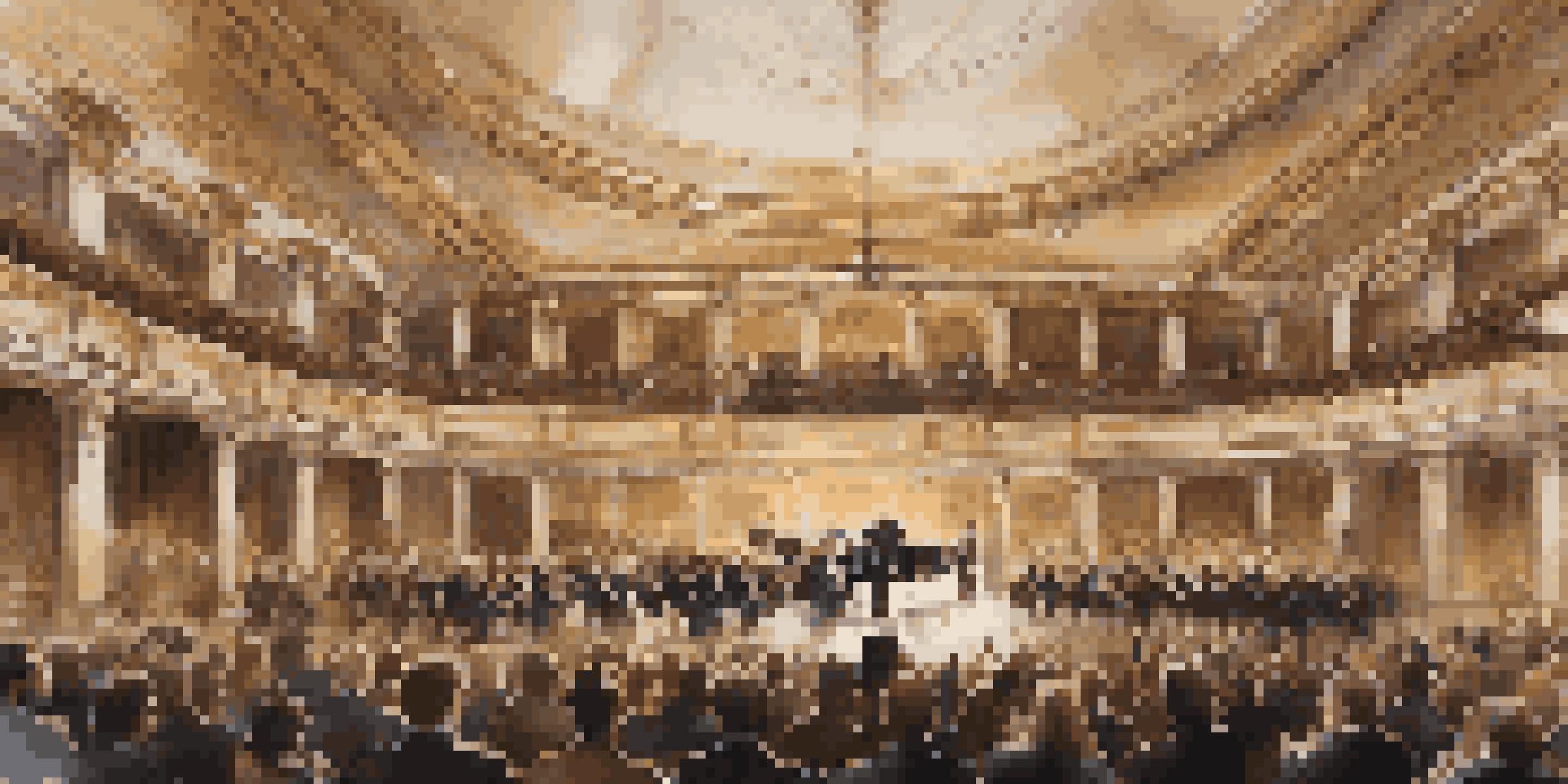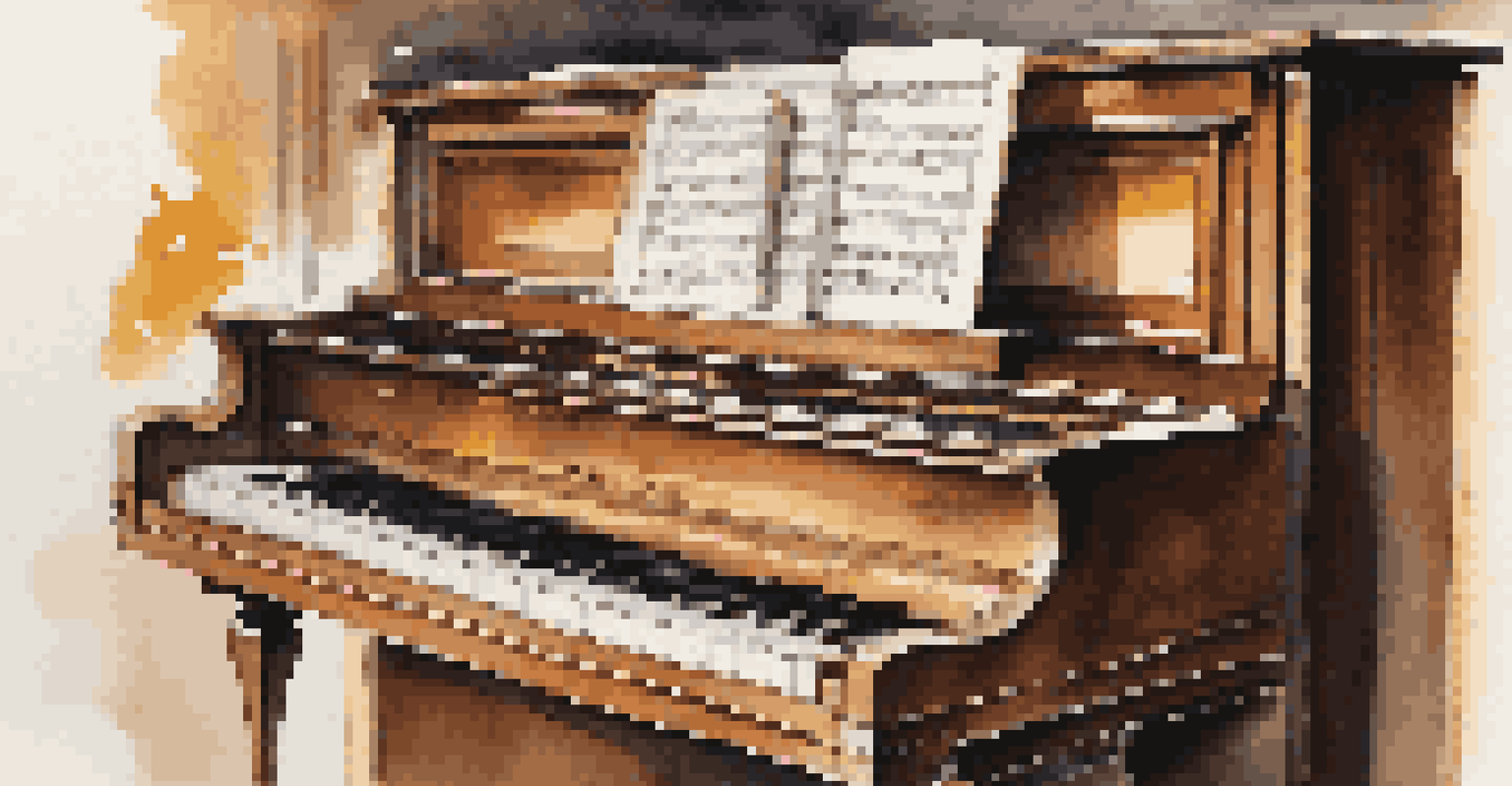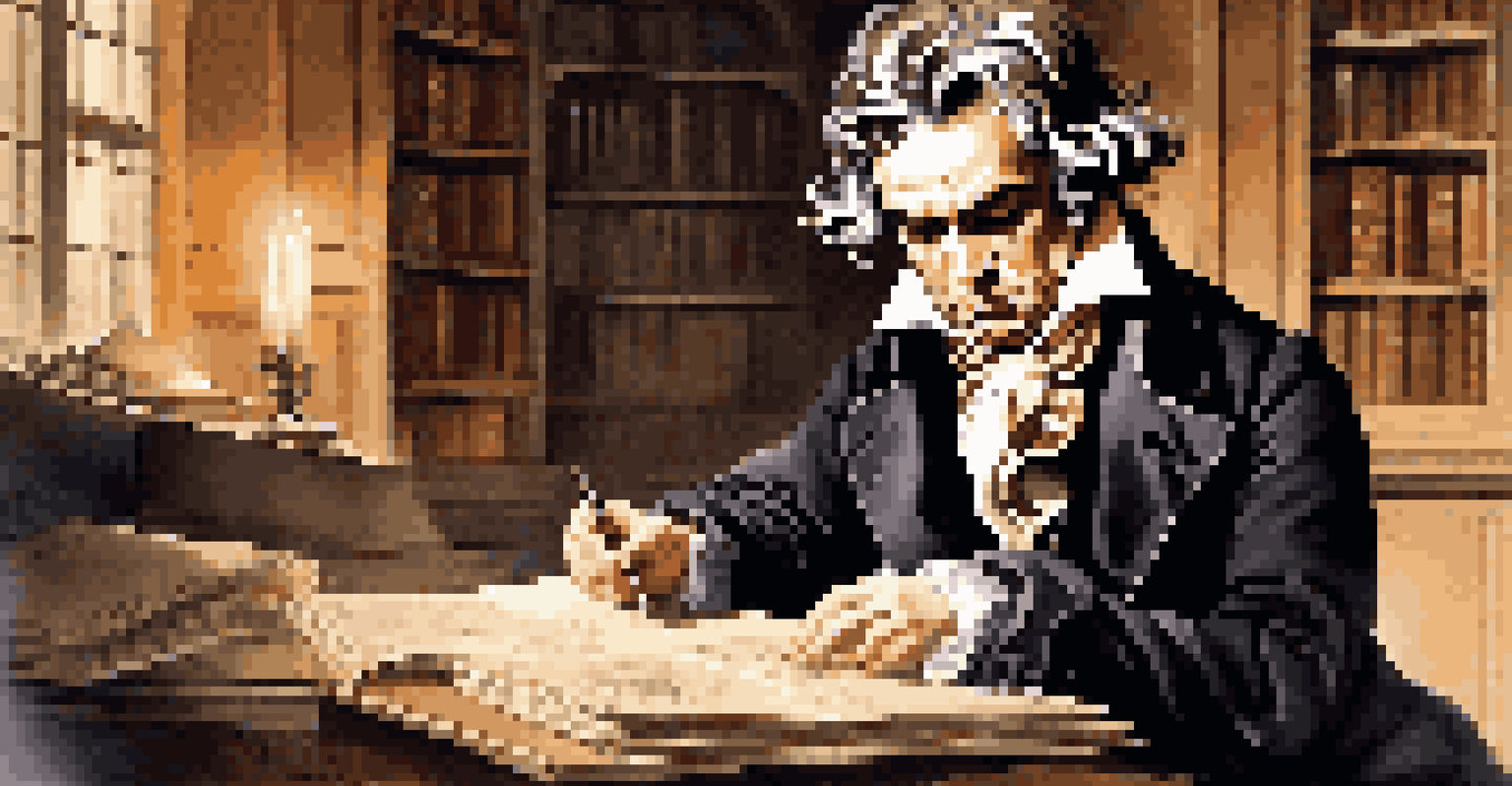The Influence of Classical Music on Political Ideals

The Historical Context of Classical Music and Politics
Classical music has long been intertwined with political movements, serving both as a reflection of and a catalyst for social change. Throughout history, composers like Beethoven and Mozart were not just musicians; they were cultural figures who expressed their political beliefs through their art. For instance, Beethoven's Symphony No. 3, the 'Eroica,' was originally dedicated to Napoleon Bonaparte, symbolizing the ideals of liberty and heroism.
Music can change the world because it can change people.
In the 18th and 19th centuries, music became a vehicle for revolutionary ideas, with operas and symphonies often addressing themes of freedom and justice. The ability of classical music to evoke powerful emotions made it an ideal medium for political expression, often rallying people around a cause. As political revolutions swept across Europe, composers found ways to incorporate the spirit of the times into their compositions.
This historical backdrop sets the stage for understanding how music can transcend mere entertainment, becoming a powerful tool for political dialogue and expression. The connection between art and politics is evident as we explore the ways classical music has influenced and mirrored political ideals throughout the ages.
Beethoven: The Revolutionary Composer
Ludwig van Beethoven is often heralded as a revolutionary figure in classical music, not just for his innovative compositions but also for his political ideals. He believed in the power of music to inspire change and promote freedom, which resonates deeply in pieces like his 'Ode to Joy.' This piece, based on a poem by Friedrich Schiller, celebrates unity and brotherhood, ideals that echoed the sentiments of the French Revolution.

Beethoven's life and work exemplify how classical music can serve as a form of protest against tyranny. His dedication to Napoleon was a bold statement of support for democratic ideals, showcasing the role of music in shaping political narratives. Over time, however, he rescinded this dedication, reflecting his disillusionment with Napoleon's rise to power, which illustrates the complex relationship between music and political figures.
Music as a Political Tool
Classical music has historically served as a powerful medium for political expression, reflecting and influencing societal ideals.
Through Beethoven's compositions, we see the potential for music to inspire not only emotion but also action. His music invites listeners to reflect on their own political beliefs, proving that classical music can transcend time and continue to influence ideals in contemporary society.
The Role of Music in Political Movements
Throughout history, classical music has played a significant role in various political movements, from the American Revolution to the Civil Rights Movement. Composers and musicians have used their platforms to raise awareness and advocate for change, often incorporating political themes into their works. For example, Aaron Copland's 'Fanfare for the Common Man' became an anthem for democracy during World War II, inspiring hope and unity among citizens.
The power of music makes all the difference in the world.
In more recent times, classical music has continued to resonate within political contexts, often performed at rallies and events that champion social justice. The music serves not only as a backdrop but as a rallying cry that brings communities together in pursuit of a common goal. This illustrates how classical music can both inspire and mobilize individuals to take action for political causes.
By examining these movements, we can appreciate the profound impact of music on shaping political climates and ideals. Classical music, with its rich history, serves as a reminder of the enduring connection between art and activism, highlighting its ability to transcend boundaries and unite people in their quest for change.
Composers as Political Commentators
Many composers have taken on the role of political commentators, using their compositions to critique societal issues and influence public opinion. For example, Dmitri Shostakovich's symphonies often reflected the turmoil of life under Soviet rule, subtly conveying dissent through his music. His work resonates with those who lived during oppressive times, showcasing how composers can express their political views without direct confrontation.
Similarly, Benjamin Britten's operas often tackled themes of war and peace, inviting audiences to reflect on the human condition in the face of political strife. His piece 'Peter Grimes' addresses social isolation and injustice, employing music as a means to spark conversation around difficult topics. This ability to weave political commentary into classical music adds another layer of depth to its influence on societal ideals.
Beethoven's Political Influence
Ludwig van Beethoven exemplified how compositions can convey revolutionary ideals and inspire listeners to reflect on their political beliefs.
By turning their personal experiences and observations into art, composers have shaped the political landscape in subtle yet profound ways. Their work encourages listeners to engage with political themes, proving that classical music can serve as a powerful form of expression and critique.
The Emotional Power of Classical Music
One of the most compelling aspects of classical music is its emotional power, which can evoke strong feelings and inspire action. The ability of music to convey complex emotions allows it to connect with listeners on a profound level, making it an effective tool for political messaging. When a symphony swells with intensity, it can rally crowds and stir passion for a cause, transcending language and cultural barriers.
For instance, the use of classical music in films often highlights key political moments, reinforcing themes of struggle and triumph. The iconic score of 'Schindler's List' serves as a poignant reminder of the atrocities of war, prompting audiences to reflect on the moral implications of history. This demonstrates how music can amplify the emotional weight of political narratives, making them more relatable and impactful.
As we explore the emotional landscape of classical music, we see its potential to foster empathy and understanding. Music has the power to connect us to the human experience in ways that words alone often cannot, making it a vital component of political discourse.
Classical Music in Contemporary Politics
In today's world, classical music continues to play an integral role in contemporary politics, often used in campaigns and public events to evoke a sense of tradition and gravitas. Politicians frequently employ classical pieces to signify their values, projecting an image of sophistication and seriousness. For example, the use of Beethoven's 'Ode to Joy' at events can evoke themes of unity and hope, aligning with political messaging.
Moreover, various orchestras around the globe have taken a stand on social issues, using their platforms to advocate for change. By performing pieces that address themes of justice and equality, these organizations influence public perception and inspire action among their audiences. This modern intersection of classical music and politics highlights the genre's enduring relevance in addressing contemporary issues.
Contemporary Relevance of Classical Music
Today, classical music continues to resonate in political contexts, highlighting its role in advocacy and social change.
As we examine the ongoing relationship between classical music and politics, it becomes clear that this connection is not just historical but also evolving. The ability of classical music to resonate with current political climates underscores its importance as a tool for expression and advocacy in our society today.
The Legacy of Classical Music in Political Thought
The legacy of classical music in shaping political thought is profound, leaving an indelible mark on both culture and society. As we look back at the composers and their works, we see a tapestry of ideas and ideals that have influenced generations. The themes of freedom, justice, and human experience embedded in classical compositions continue to resonate in modern political discourse.
This legacy also reminds us of the power of art as a form of resistance and expression. As political landscapes shift and evolve, the music created during pivotal moments in history remains relevant, serving as a reminder of the struggles and triumphs of the past. The ability of classical music to communicate complex emotions and ideas ensures its continued role in political thought.

In conclusion, the influence of classical music on political ideals is an ongoing conversation that invites us to reflect on our values and beliefs. By appreciating the interplay between music and politics, we can better understand how art shapes our world and inspires us to engage with the issues that matter most.